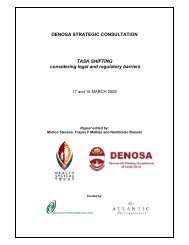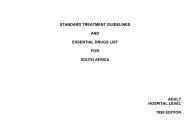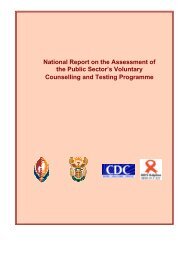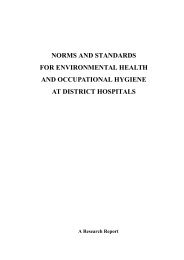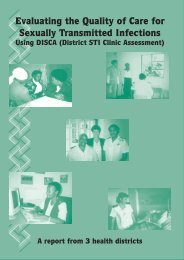SAHR 2007 - Health Systems Trust
SAHR 2007 - Health Systems Trust
SAHR 2007 - Health Systems Trust
You also want an ePaper? Increase the reach of your titles
YUMPU automatically turns print PDFs into web optimized ePapers that Google loves.
HIV and AIDS, STI and TB in the Private Sector 14<br />
Furthermore, the Centre for <strong>Health</strong> Policy and the London<br />
School of Hygiene and Tropical Medicine in collaboration<br />
with the Department of <strong>Health</strong> has developed a manual,<br />
‘Working with Private Providers on the Control of Sexually<br />
Transmitted Infections’ for district programme managers. The<br />
introduction to this manual notes that private providers in<br />
workplaces, clinics, and private surgeries have a significant<br />
role to play in STI care in South Africa.<br />
This is already occurring on a limited scale. For example,<br />
Right to Care (RtC), a non-governmental organisation (NGO)<br />
mostly funded by the President’s Emergency Plan for AIDS<br />
Relief (PEPFAR), provides antiretroviral therapy (ART) through<br />
partnerships with government, NGOs and community-based<br />
organisations and with the private sector. The private sector<br />
programme is run with a financial services company where<br />
employers pay for their antiretrovirals (ARVs) and RtC funds<br />
private practitioners to see patients in different communities.<br />
There is evidence of integration of HIV management and STI<br />
care in this model. 11<br />
It is important for role players to adopt the recommended<br />
approach to STI management, including nationally formulated<br />
clinical guidelines. From the government’s perspective,<br />
adherence to clinical guidelines in the private sector will not<br />
only ensure effective management of patients at all levels<br />
and sectors, but it will also delay the development of drug<br />
resistance and contribute to the control of STIs and the<br />
reduction of HIV transmission.<br />
Tuberculosis<br />
A rapid increase in the detection of TB in a high HIV and AIDS<br />
environment and the emergence of multi-drug resistant TB<br />
(MDR-TB) has led the national and provincial governments<br />
to identify TB as a priority. The NSP clearly articulates within<br />
goal 6 and objective 6.3 the need for the private sector to<br />
partner as a lead agency with other stakeholders in “effective<br />
management of TB/HIV co-infection” and in intervening<br />
to “ensure implementation of the National TB control Plan”. 1<br />
Whilst the public health sector is predominant in the provision<br />
of TB care across the country, there are private providers<br />
of TB treatment. These providers can be classified into three<br />
main groups:<br />
1. Employer-based private providers (e.g. the mining<br />
industry TB services provided either in-house or<br />
contracted out to managed health care companies)<br />
2. Private for-profit providers<br />
3. Private not-for-profit providers (e.g. the NGOs providing<br />
community-based TB treatment)<br />
Public-private partnerships involving some of the private<br />
providers are an important component of TB care and are<br />
discussed below.<br />
Employer-based private providers<br />
There is a long history of provision of TB treatment in the<br />
mining industry. According to the Occupational <strong>Health</strong> and<br />
Safety Act (Act 85 of 1993) and the Mine <strong>Health</strong> and Safety<br />
Act (Act 29 of 1996) mining companies are responsible for<br />
ensuring TB surveillance, treatment and notification and in<br />
cases of possible chronic lung damage, the assessment of<br />
impairment and submission of cases for compensation. 12,13<br />
According to the provisions of the regulatory framework,<br />
employers are required to cover the cost of TB services for<br />
their employees. Some mining companies provide medical<br />
services (including TB services) in-house, whilst other companies<br />
contract these services out to managed care companies.<br />
The managed care companies are paid on a capitation<br />
basis by the employer to provide a comprehensive<br />
service to lower income groups of employees. Higher income<br />
employees contribute to medical schemes and can choose<br />
health care providers. Like the majority of employer-based<br />
health services, mining companies generally do not provide<br />
health care services for the wider community (i.e. people other<br />
than the companies’ employees and their dependents).<br />
Private for-profit providers<br />
South Africa has a long history of contracting chronic clinical<br />
care to private for-profit providers. Clinical contracts<br />
awarded for hospital TB services are provided by Lifecare<br />
Group Holdings (Lifecare). The contract with Lifecare uses<br />
the per-diem payment method, requiring the government to<br />
reimburse Lifecare retrospectively for the number of annual<br />
patient days delivered. A study on the relative efficiency of<br />
contracting out versus direct provision of hospital services<br />
in South Africa found that for contracting out to generate<br />
efficiency gains the necessary conditions for an efficient<br />
contract must be in place. 14 These conditions include strong<br />
government capacity to negotiate, implement and monitor<br />
contracts; adequate information on government’s own<br />
production costs, as well as those of competitors; and the<br />
presence of actual or at least potential competition. Most<br />
of these conditions are not present in the contract with<br />
Lifecare.<br />
207







